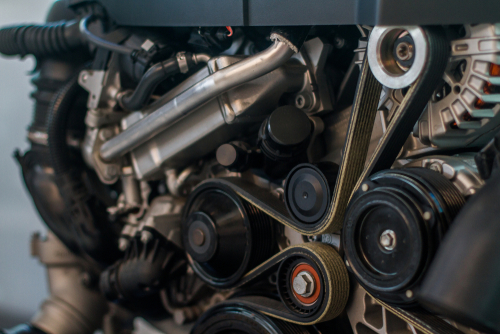If there is a squeaking sound when you start your vehicle or turn the wheels, this may indicate a problem with the serpentine belt. The sound is not just obnoxious, it can also be dangerous. The best way to make your car’s serpentine belt stop squeaking is to replace it. Let’s look at how to stop a squeaky serpentine belt.

Stop the Squeaking Serpentine Belt by Replacing it
If you notice a squeaking or squealing noise created by the serpentine belt, your belt is worn and likely needs to be replaced. To stop a serpentine belt from squeaking, you should first inspect it by looking under the hood. Check to see whether your serpentine belt looks worn or damaged. You can also check whether the tension is good. Here’s how to check it.
Serpentine belts are very cheap and easy to replace, so if your belt has any problems, it’s best to replace it. The main cause of a squeaking serpentine belt is wear and tear, which happens as the belt ages. However, serpentine belts squeak for many other reasons; perhaps your belt has been incorrectly fitted, has incorrect tension, or a misaligned pulley.
Other more severe cases include a failing pump or motor. You may need to take your car to a mechanic to have more severe issues diagnosed and fixed. The underlying problems will need to be fixed and the serpentine belt replaced.
Common Causes of a Squeaky Serpentine Belt
The job of a serpentine belt is to drive the auxiliary functions of your vehicle. It’s used to charge your car’s battery (via the alternator) and helps to operate the power steering, air conditioner, and coolant system.
Serpentine belts generally last for between 50 and 100 thousand miles. So if you’ve been clocking up the miles recently and are having issues with your serpentine belt, it’s likely to be down to wear and tear, and your belt should be replaced.
A squeaky serpentine belt can be due to it being improperly maintained or affected by environmental factors. Here are the main causes of noise and how to stop a squeaky belt.
Wear and Tear (Very Common)
As mentioned above, the leading cause of squeaking is due to wear and tear. Serpentine belts stretch as they age and eventually become ineffective. A serpentine belt that has slipped on a pulley will make a squeaking noise. When you inspect the serpentine belt, you may notice damage to the ribs and grooves on the belt. Likely, the edges of the belt will also show signs of damage. Once a serpentine belt has started to show signs of wear and tear, the best thing to do is to replace it.
Misaligned Belt (Very Rare)
Another common cause of serpentine belt squeaking is due to a misaligned belt. The belt may have been incorrectly fitted or may have slipped due to wear and tear. Incorrectly fitted belts will wear unevenly and make a noise.
A misaligned belt can also put pressure on the auxiliary functions, which will cause further issues in the long run. Problems such as a low battery charge, engine overheating, and faulty power steering could occur. Therefore, it’s a good idea to replace the serpentine belt to stop it from squeaking and ensure your vehicle remains in good working order.
Weather conditions
Sometimes the weather can affect serpentine belts. Overheating due to a hot climate can cause the rubber to corrode. If moisture gets into the system, this can also cause the belt to become noisy. The squeaking is like to indicate a problem with moisture if you notice the noise when there is dew on the ground or heavy fog. Cold temperatures can also stiffen the rubber belt, causing it to work ineffectively. If you think that the weather conditions have damaged your belt, the best thing to do would be to replace it.
Often the noise during bad weather is your first indication the the belt is reaching the end of it’s service life.
Contamination
Sometimes a belt will squeak because it’s been contaminated with oil or grease. If your serpentine belt has a shiny oily sheen take a look, this likely to be the case. When this happens it’s usually oil leaking from the timing cover, or the power steering pump that has caused the noise.
Conclusion
If you’ve noticed that your serpentine belt has started making squeaking noises, the best thing to do is to remove it so that you can check the cause of the problem. You should also have a look to see if the pulleys and bearings are working correctly. The leading cause of the noise is due to a worn serpentine belt, and the best thing to do in most cases is to replace the belt.


